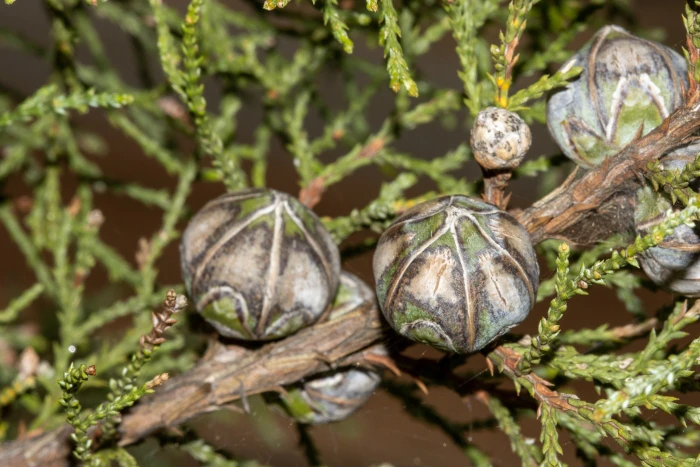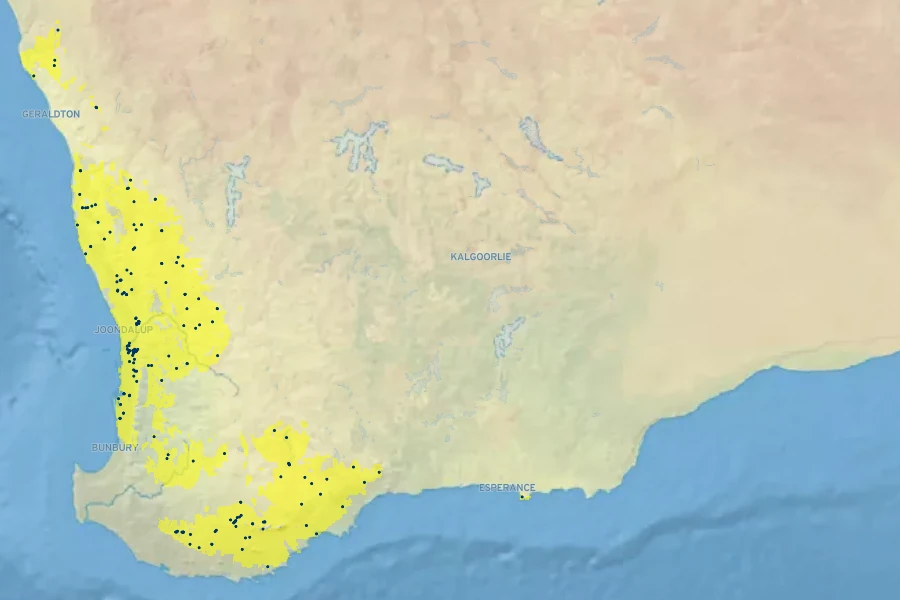Swan River Cypress
/
(Actinostrobus pyramidalis)
Swan River Cypress (Actinostrobus pyramidalis)
/

© Tim Hammer
CC BY 4.0
Image By:
© Tim Hammer
Recorded By:
Copyright:
CC BY 4.0
Copyright Notice:
Photo by: © Tim Hammer | License Type: CC BY 4.0 | License URL: http://creativecommons.org/licenses/by/4.0/ | Uploader: thammer | Publisher: iNaturalist |
















Summary
Actinostrobus pyramidalis, commonly known as Swan River cypress or King George’s cypress pine, is a coniferous tree or shrub native to the sandy soils and heathlands of southwestern Western Australia. This evergreen species typically reaches up to 26 feet in height and is characterized by its scale-like leaves arranged in whorls of six along the twigs, giving it a textured appearance. The male cones are diminutive, measuring just 0.1-0.2 inches long, while the female cones are slightly larger at 0.4-0.8 inches and take 18-20 months to mature. The cones exhibit serotiny, remaining closed for extended periods and opening in response to environmental triggers such as the heat from bushfires.
Swan River cypress is valued for its adaptability to poor soils and its ornamental qualities, including its unique foliage and conical form. It is used in cultivation for reforestation projects, as a windbreak, and in native plant gardens where its low water requirements and tolerance of sandy soils are advantageous. It thrives in full sun and requires well-drained soils. While it is not commonly afflicted by diseases, it can be susceptible to root rot if planted in poorly drained areas. Its serotinous cones are an adaptation to fire-prone environments, ensuring seed release after bushfires, a feature that can be both a horticultural curiosity and a mechanism for natural regeneration.CC BY-SA 4.0
Swan River cypress is valued for its adaptability to poor soils and its ornamental qualities, including its unique foliage and conical form. It is used in cultivation for reforestation projects, as a windbreak, and in native plant gardens where its low water requirements and tolerance of sandy soils are advantageous. It thrives in full sun and requires well-drained soils. While it is not commonly afflicted by diseases, it can be susceptible to root rot if planted in poorly drained areas. Its serotinous cones are an adaptation to fire-prone environments, ensuring seed release after bushfires, a feature that can be both a horticultural curiosity and a mechanism for natural regeneration.CC BY-SA 4.0
Plant Description
- Plant Type: Shrub, Tree
- Height: 6-26 feet
- Width: 2-12 feet
- Growth Rate: Moderate
- Flower Color: N/A
- Flowering Season: Non-flowering
- Leaf Retention: Evergreen
Growth Requirements
- Sun: Full Sun, Part Shade
- Drainage: Fast, Medium, Slow
Common Uses
Drought Tolerant, Erosion Control, Low Maintenance
Natural Habitat
Sandy soils and heathlands of southwestern Western Australia
Other Names
Common Names: Swan River Cypress, Swan River Cypress Pine
Scientific Names: Actinostrobus pyramidalis, Actinistrobus pyramidalis, Callitris actinostrobus, Callitris pyramidalis, Frenela actinostrobus
GBIF Accepted Name: Actinostrobus pyramidalis
